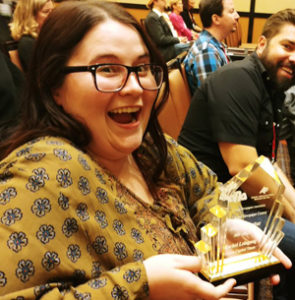By Phil Riske | Senior Reporter/Writer
Rachel Leingang (whose name is pronounced a couple of ways) covers the governor’s office and statewide elected officials, as well as the Corporation Commission and energy/environmental issues for Arizona Capitol Times. Originally from North Dakota, She earned a bachelor’s degree in journalism and international studies from Minnesota State University-Moorhead. Later, she earned a master’s degree in mass communications from Arizona State University’s Walter Cronkite School of Journalism and Mass Communication, where she worked for the school’s wire service, Cronkite News. We interviewed Leingang by email.

Arizona Capitol Times grabbed numerous Arizona Newspaper Association awards last week, including Story of the Year by you. Tell us about that story and your experiences in reporting it.
The story focused on a cut to cash assistance payments that go to needy families in Arizona. The legislature and governor’s office had cut the lifetime limit for these benefits down to one year, the lowest in the nation. And I found in agency budget requests that repeated cuts to cash assistance had hindered other programs, namely child support collection efforts. I found a woman with five children who had left a domestic violence situation who had reached the time limit, so I told her story in conjunction with how the repeated cuts affected the budget. Her situation wasn’t unlike many women with children who the Temporary Assistance for Needy Families program helps support. The amount of money per family is small, and to qualify, people have to be extremely needy. It’s designed to help families get back on their feet, but many advocates for the program say one year isn’t nearly enough time to get people back on track. After the story ran, the governor’s office sought to increase the lifetime limit back up to two years, and the measure was eventually approved by the legislature in the 2017 session.
What is the secret to good political reporting?
The best political reporting shows whom policies actually impact, not just how they impact the political prospects of those who create them. They seek to add context and a critical eye. I’m less interested in the horse-race type of political reporting that says who wins and who loses on any given issue. The stories that stick with me tell me not only what happened, but how it happened and why it matters. The best stories hold people with power, especially the elected ones, accountable for their actions and decisions. And I don’t just mean months-long investigative projects, though those are obviously important and there should be more of them.
Everyday beat reporting on politics is all the more vital, and there’s less and less of it at the local and statewide levels. The secret to it isn’t really a secret, I don’t think — it’s putting in the day-to-day work to understand the players and how they operate, and it’s paying attention to what they’re doing and whom it affects. It’s making sure sources trust that you’re fair, but know that it isn’t your job to be their friends. And I’ve increasingly relied on documents and data to inform reporting that cuts through the political spin cycle.
Have you ever had to retract something you wrote?
No.
Several of your colleagues have told us the Arizona Legislature has become more partisan, less progressive over the years. Do you agree?
I haven’t been around long enough to have firsthand experience to inform my answer on this one. But here’s one example I often hear made in defense of the “less progressive” argument: The Arizona Constitution is often regarded as a fairly progressive document, particularly its tenets related to the citizens’ initiative process. And in recent years, that process has come under attack in the legislature, with various measures designed to hinder the ability of citizens to successfully put a question on the ballot. While I’ve certainly heard a lot of folks talk about how bipartisanship used to rule the day, it’s never really been a thing in my lifetime at any level, really.
You cover the Corporation Commission, which has been a hotbed of controversy over the past couple years. Comment on those issues and your experiences covering the agency.
The Corporation Commission is perhaps the most important aspect of state government that no one knows anything about. They set rates for most people’s utility bills in Arizona, so they directly affect your pocketbook. It’s important how the agency functions, who runs things, which groups have influence over policies and what that all means for your wallet at the end of the day.
I’ve tracked influence at the commission and covered how policies came to be, particularly those related to solar energy. Though the solar issue has died down a lot over the past year or so, the commission itself still does a lot of consequential work that should be monitored by the press. Recently, the FBI brought a case against a utility owner, a lobbyist and a former Corporation Commissioner over an alleged bribery scheme to increase rates for the utility. That case highlights why the commission is important — you have utilities tasked with serving the public that have millions on the line in some of these commission decisions.
Was Arizona a culture shock for you coming from North Dakota?
Before coming to Arizona, I had lived abroad (in Scotland and Peru), so I had experienced much larger culture shock than Arizona. And there are a ton of Upper Midwesterners who live in Arizona for at least part of the year, including some of my relatives. Politically, North Dakota and Arizona are both conservative, but the political arena in Arizona is much livelier. People in North Dakota often practice that mythical Midwestern politeness, so they don’t like to talk politics at all. In Arizona, people, especially the people I talk to regularly for work, are much more open and straightforward with what they think and not as concerned with avoiding confrontation. No one knows how to pronounce my last name here, though, and in my hometown, it’s one of the most common names. (Though, to be honest, I’m not sure how it’s pronounced either — half my family says it one way, half another. Could be either: Lang-gang or Line-gang. I say it either way. )












